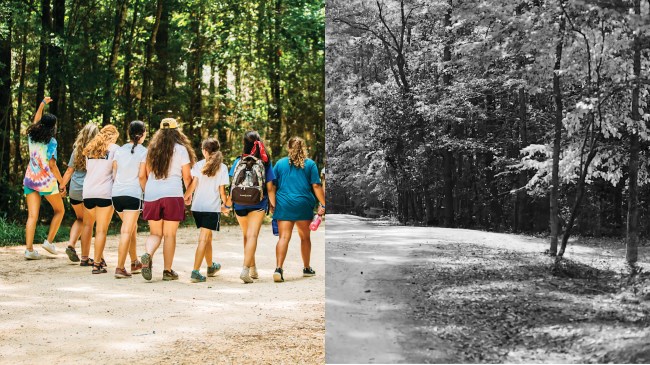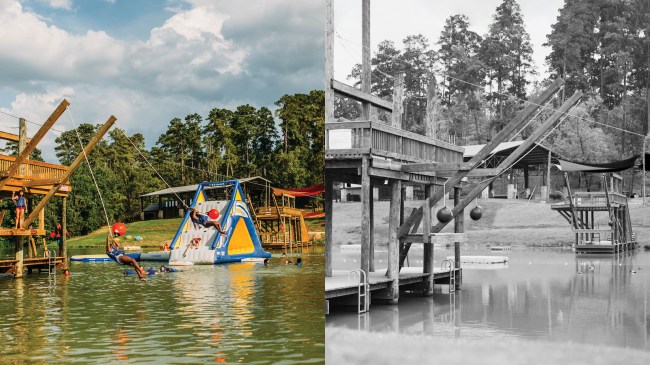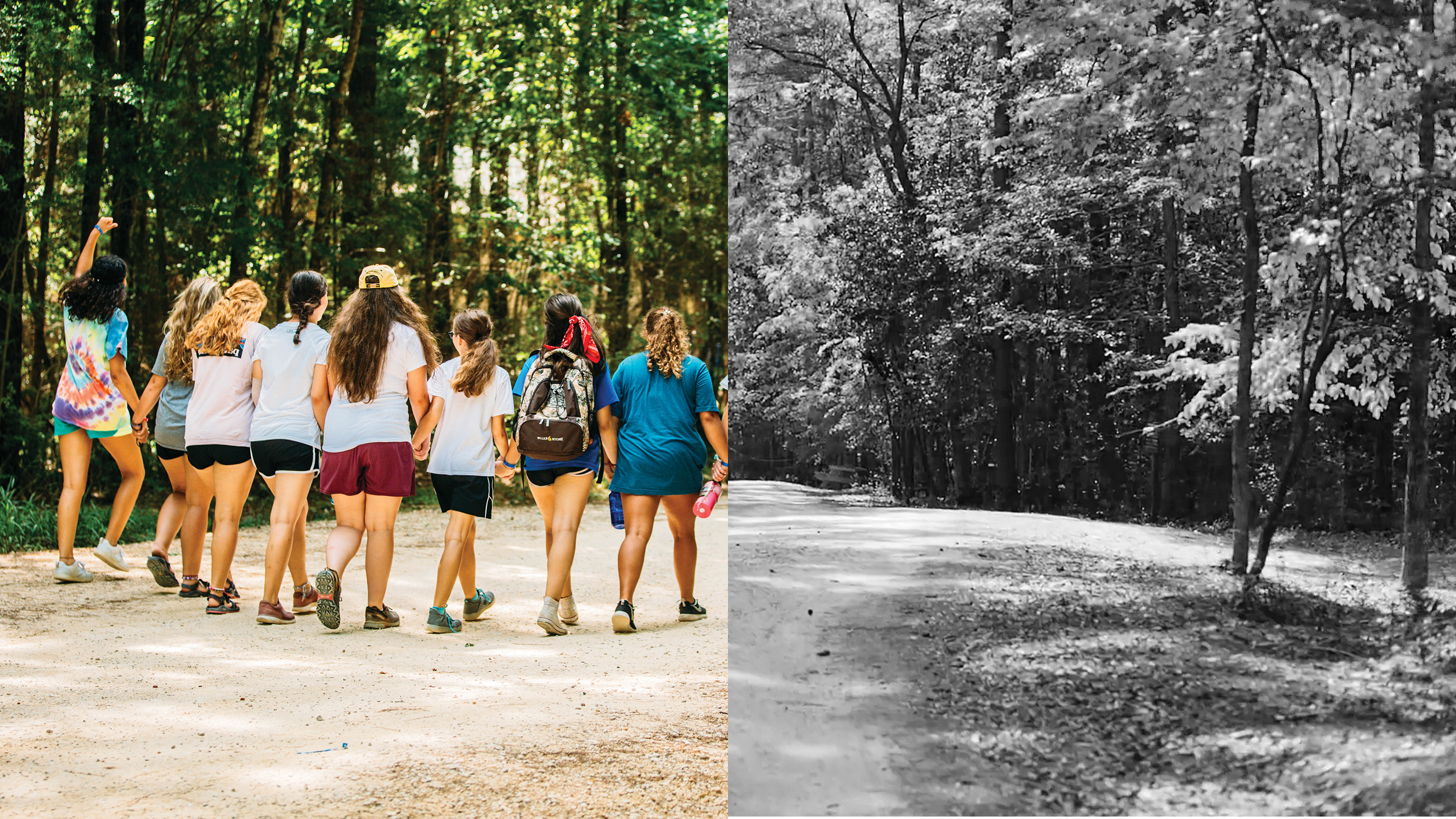The sounds of Christian camp are the soundtrack of my summers. Joyful shouts from the athletic fields echo across the valley in the afternoons, and voices lifted in praise roll from the chapel at dusk.
Each year, my family moves to the grounds of the 250-acre camp in rural northwestern Pennsylvania, where my husband serves as executive director. During the off-season, we long for camp and pray for the rowdy campers and staff members who will trek down the gravel lane the next summer.
Camp can be a peaceful place. But this year, many camps are eerily quiet. The ones that are open are emptier than usual. Staffers wave instead of smacking high-fives. The smells of disinfectant and hand sanitizer overpower the familiar cedar cabin scent. “Let’s go wash our hands!” is a common refrain. Like so many things in the age of coronavirus, camp is not the same.
When the pandemic shut down schools and businesses back in the spring, Seneca Hills Bible Camp and Retreat Center, where my husband works, became a food distribution site for kids to get free meals on the weekends. Other Christian sites, like Camp Cho-Yeh outside Houston, offered their cabins to health care workers who needed to isolate from their families while treating COVID-19 patients. Crescent Lake Bible Camp in Rhinelander, Wisconsin, was among the locations that replaced spring break camps with childcare programs for frontline workers.
Like most businesses and ministries across the country, Christian camps felt the economic halt right away. Church retreats and events were called off in March, April, and May due to bans on mass gatherings across the states. Before long, camps were forced to grapple with the unimaginable: no summer camp.
By May’s end, more than 100 Christian camps had announced cancellations. Most of the rest made dramatic changes to summer programming. Summer camp can represent half of a camp’s annual revenue or more, so skipping it for a year comes as a massive financial blow.
Dan Busby, president emeritus of the Evangelical Council for Financial Accountability, predicted camps and conferences would be among the ministry sectors hit hardest by the shutdowns because of their seasonality. Camps owned by a single church or regional church body can barely hold on from month to month.
In March, Vanderkamp Center, an ecumenical campsite in upstate New York, announced it would be shutting down for good after 55 years of ministry, citing faltering finances and the COVID-19 pandemic. LifeWay Christian Resources canceled 311 camps and events scheduled for this summer. It announced plans to sell the Southern Baptist Convention’s Ridgecrest Conference Center in North Carolina, which called off its traditional two-week camp sessions and postponed the rest of its programming (like sessions for families).
Industry experts predict that summer 2020 is only the beginning, and the coronavirus crisis is going to hamper enrollment for years to come. With families unable to afford the cost or afraid to send their kids into close quarters where viruses can spread quickly, Christian camps aren’t just asking whether they can survive one year with no camp or fewer campers—they’re looking at perhaps two or three years below the capacity they’re used to.
Camp after quarantine
Camp directors and staff will tell you it’s not the financial pressure but the campers themselves who inspire them to keep camp going somehow. They see camp as a crucial place to train the next generation of Christian leaders—a gospel-infused, community-centered environment away from screens and school pressures.
Camp staff know firsthand that the concentrated fellowship time in the cabins and on the grounds stands to bear gospel fruit in young believers.
“After COVID-19, we will see a groundswell of support for this distinctive ministry,” said Gregg Hunter, president of the Christian Camp and Conference Association (CCCA). “People will be hungry for a new experience, and I believe their souls will need feeding.”
Experts agree.
“We have to be prepared that there will be long-term impacts on the psyches of these young people,” said Jacob Sorenson, a researcher and consultant specializing in Christian summer camps. “They need places of healing when this is done, and camp can be one of those places.”
But the pandemic isn’t over, and this year, many camps decided to do the unthinkable. They called off summer offerings, some for the first time ever. Others opted to transfer activities to the virtual realm they’d otherwise encourage campers to escape.
The future of Christian camps may depend on how ministries respond to this crisis. Camps stake everything on trust. Many of the CCCA’s 870 members built their reputations on growing the faith of young campers over decades of ministry, establishing relationships with churches, and serving families across multiple generations.

Over the years, camps have reassured parents that their children will be spiritually nurtured and kept safe as they swim, climb, and play. In recent years, they have emphasized that staff members are background-checked and trained to protect campers from abuse. And now, camps must meet the challenge of keeping participants safe from the coronavirus—whether that means taking new precautions or canceling camp for a season.
Camp Cho-Yeh in Texas was among the first to say it would stay closed for the summer.
“It makes me so sad to think that this place is going to sit empty over the course of the summer,” president and CEO Garret Larsen said in a video in late March.
With over 4,000 campers attending the camp each summer for Bible studies, color war competitions, rock climbing, archery, and water games, Cho-Yeh’s enrollment ranks in the top 5 percent of summer camps in the US. It brings in $4 million of its $7 million budget during summer.
Cho-Yeh was set to run out of cash in May, but a Paycheck Protection Program grant extended the camp’s resources by eight weeks. Larsen initially cut 42 of the camp’s 50 full-time staff members. Then, once Texas lifted its mandatory 14-day self-quarantine rule for travelers, the camp opted to move forward with a shortened season—1,500 campers over five weeks instead of the typical ten.
COVID-19 represents a unique threat to the camping landscape. From hugs and high-fives to team-building activities and cabin bunk beds, camp and social distancing do not mix. In 2009, swine flu loomed over summer plans but was manageable: The H1N1 virus could be treated with antiviral drugs, and patients needed to be quarantined only until they had been fever free for 24 hours. But the new coronavirus has been harder to track and contain, due to a longer incubation period.
Camps that serve medically vulnerable populations or that meet on college campuses had to cancel in-person summer camp, according to the American Camp Association.
Certain state restrictions, such as in Arkansas, mandated that camps stay closed through May, when they would typically be training staff to prepare for campers in June, July, and August.
Most camps tried to minimize risks by cutting programs and amping up health precautions. Cho-Yeh developed a cohort model for keeping campers in smaller groups, shortened sessions to give more time to clean in between, and adopted protocol for isolating kids who show COVID-19 symptoms.
SAMBICA in Bellevue, Washington, did away with camp-wide gatherings and overnight camps and restricted enrollment to county residents.
Forest Home Christian Camps in California had a plan in place—screening for sick campers, upgrading air filters, providing hand sanitizer, and isolating the sick—but in the end, its Mill Creek Canyon site had to call off this summer’s camps and retreats. “Given the close community experience of camp with large group gatherings, group dining, team competitions, and shared lodging, we did not see a practical way to operate camp safely,” it stated.
Word of Life Youth and Family Camps, one of the biggest Christian camps in the country, canceled summer camp and fall retreats at its home campus in the Adirondacks.
Like many camp ministries shifting plans, the camp asked participants to consider registering for a 2021 session or even donating their deposit rather than requesting a refund. “As you can imagine, this situation has significant stewardship challenges and any gift would be much appreciated,” the New York–based camp wrote. “We need your support and contributions in order to sustain our current operations and to continue sharing the gospel with this generation and generations to come.”
Groups that had registered for LifeWay’s 96 FUGE camps were given the option to transfer their deposits to a 2021 session or accept a 50 percent refund and 50 percent LifeWay credit.
Other camps are asking for additional donations to see them through the uncertainty that will extend well beyond the lifting of public-gathering bans. Cho-Yeh’s Larsen suspects that after canceling some 2020 sessions, enrollment in 2021 will not return to pre-pandemic levels.
Camp as spiritual formation
Christian camp is a special place for folks like me. Year after year, I get to watch shy campers slowly open up. I see counselors’ beaming faces as they describe campers praying to receive Jesus as their Savior. I watch my own sons’ sense of adventure, confidence, and faith grow as they play and help during our summers spent at Seneca Hills.
Camp is also a special place for the Christians who were those shy campers and new believers, who trace the pivotal moments in their spiritual journeys to cabins in the woods.
“The typical camp experience, when done well, is a quantum leap forward for people’s faith formation,” said Kara Powell, executive director of the Fuller Youth Institute at Fuller Theological Seminary.
“My hope and prayer is that camps, youth leaders, churches, and youth ministries will pray and come up with some creative options.”
Research indicates that there’s something particularly effective about the setting as a tool for spiritual growth.

Sorenson, the camping consultant, found that two months after attending camp, 96 percent of campers reported that camp helped them grow in their faith, and 94 percent reported growing in their knowledge of God. His research also shows that attending a Christian summer camp correlates with a lasting increase in self-confidence, commitment to personal devotions, church attendance, faith conversations and practices in the home, and understanding of faith’s relevance to life (Sorenson calls this “horizontal faith”).
Other research has been more mixed, with a study in the journal Leisure/Loisir finding that the initial spiritual high after summer camp can fade over time.
One of Sorenson’s biggest takeaways, though, matches the goals of camps that focus on getting kids to unplug and play together: Young people admitted that camp freed them from electronics and social media.
As Christian camps increasingly compete with more options for kids’ summer schedules—including sports training and school activities—they have positioned themselves as a uniquely outdoorsy, incarnational, and community-driven option. In an era when teens and children have less contact with creation, camp provides an ideal location to encounter God and build friendships with each other without the distractions of school and smartphones.
But this year, many camps that couldn’t count on holding in-person activities over the summer opted to try to offer online programs rather than cancel summer activities altogether.
“In a lot of ways, it’s the antithesis of what camp is for us,” said Kellie von Borstel, camp director of Montlure, a Presbyterian church camp in Arizona. “We’re doing this because we don’t want to cancel summer camp.”
Montlure decided to offer virtual camp after calling off its overnight and day camp programs for the summer. It is using a virtual camp portal through the Presbyterian Camp and Conference Center Association, where campers can log in to participate in each day’s camp activities: craft how-tos, hiking videos, and online Bible studies.
While virtual camp is better than no camp, many kids were weary of Zoom by summer. When surveyed in the spring, less than a quarter of families were interested in enrolling in online camp.
Camps like SAMBICA in Washington offered “Camp in a Box” for elementary schoolers who couldn’t attend in person this year, with art supplies and camp swag, plus interactive videos.
To some outsiders, the efforts to pivot or offer camp activities in the midst of a pandemic may seem a bit much. What’s one year, after all? But for those of us in the camp community, our prayer is always that this summer would be the one that changes lives, that we would witness the undeniable work of God among us in our staff and campers.
Camp doesn’t just have the potential to change the lives of the kids who attend, but it impacts their families for generations to come. I think of the story of Caleb and Luke Fugate, brothers who each worked at Seneca Hills for six summers and now serve in pastoral and youth ministry. Members of the Fugate clan have camped and worked at Seneca Hills for three generations, but only because Caleb and Luke’s Uncle John accepted Christ there as an 11-year-old camper and returned home to Punxsutawney, Pennsylvania, to share the gospel with his parents and siblings.
Those kinds of stories still happen. In Johns Creek, Georgia, 1,000 families find Perimeter Church each year through Perimeter’s Camp All-American. Roughly 40 percent of the camp’s families have no prior church affiliation.
So whether through an abbreviated session, an online rally, or a socially distanced campfire, we entered the summer with the expectation that God would be at work as he always is, and that he would provide the financial backing to get us through this difficult season and the ones that lie ahead.
Megan Fowler is a contributing writer for Christianity Today.












